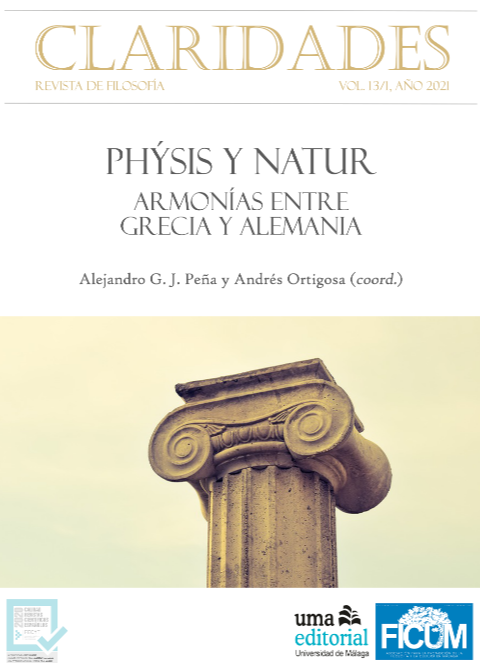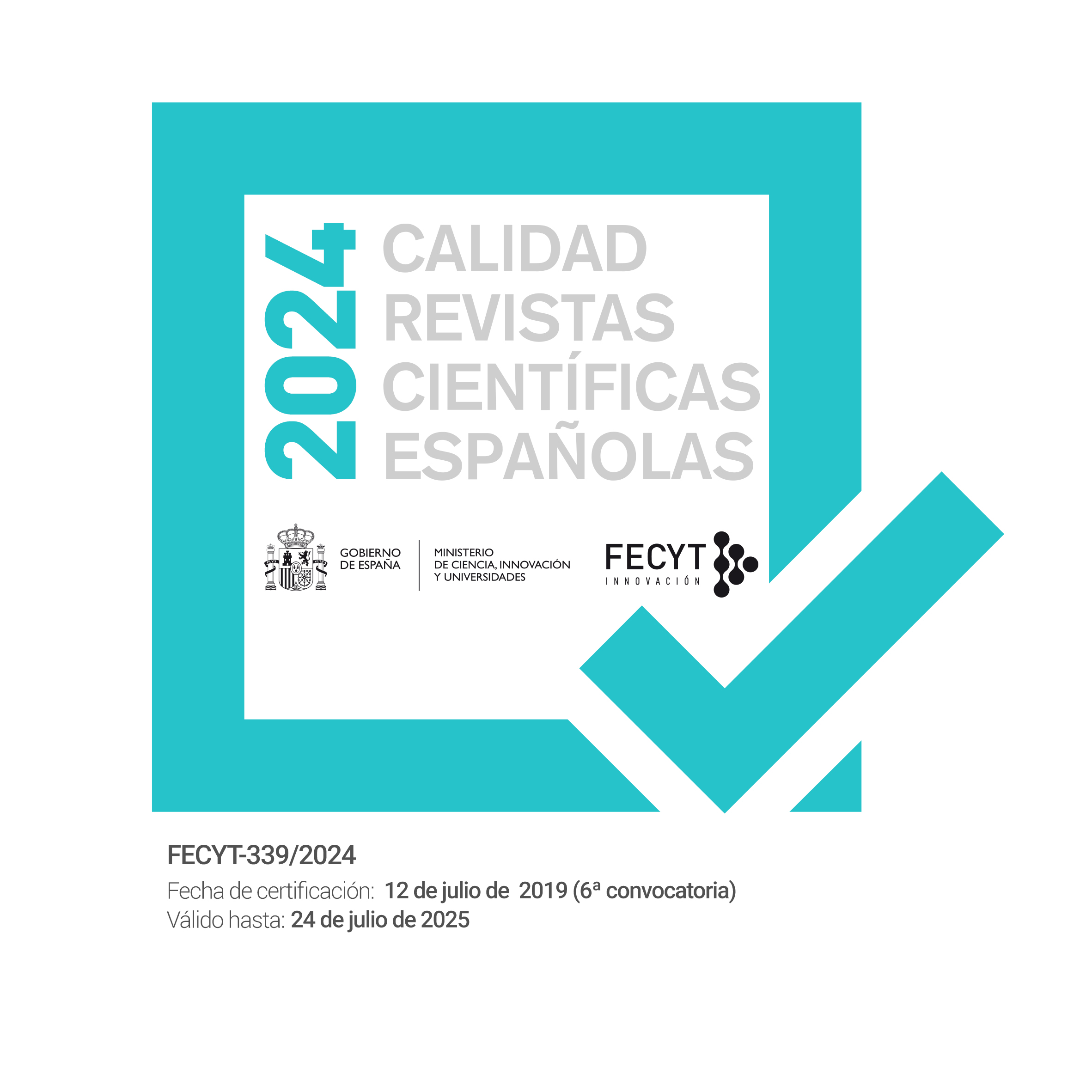The interpretation of nature
metaphysics and teleology, Nietzsche’s reading of Plato
DOI:
https://doi.org/10.24310/Claridadescrf.v13i1.10260Keywords:
Plato, Natur, Metaphysics, Teleology, Finalism, Chance, NietzscheAbstract
Metaphysics can be understood as a discipline whose object is the intelligible entities, but it is also an interpretation of nature, which is its real beginning as Plato´s «second sailing». Nietzsche´s inversion of Platonism has in the critique of finalism one of its main points. The opposition apparent/true world, from this
perspective, can be explained in terms of the absence or presence of teleology in the interpretation of nature, but in Nietzsche´s view finalism belongs to the apparent and not to the real world. Leaving aside his critique and the genealogy that he attributes to Platonism, his interpretation of Plato´s philosophy in
this point in accurate, because Plato tried to deliver with his theory of ideas a conception of the real causes of becoming, based on the categories of finality and unity, just what he called his «second sailing», as an alternative to the theory of nature proposed by Presocratic philosophy
Downloads
Metrics
Publication Facts
Reviewer profiles N/A
Author statements
Indexed in
-
—
- Academic society
- N/A
- Publisher
- Asociación para la promoción de la filosofía y la cultura en Málaga (FICUM) y UMAEditorial
References
Ávila Crespo, R. (1986): Nietzsche y la redención del azar. Granada: Editorial de la Universidad de Granada.
Bremer, D. (1979): «Platonisches, Antiplatonisches. Aspekte der Platon-Rezeption in Nietzsches Versuch einer Wiederherstellu des frühgriechischen Daseinsverständnisses», Nietzsche Studien, 1979, Band B, pp. 39-103.
Dixsaut, M. (1997): «Nietzsche, Lecteur de Platon», en A. NeschkeHentschke (ed.), Images de Platon et lectures de ses oeuvres: Les interprétations de Platon à travers les siècles, Lovaina-París: Peteers, pp. 295-313.
Galparsoro Ruiz, J.I. (1995): «El joven Profesor Nietzsche y Platón», Enrahonar, 24, 1995, pp. 47-72.
Ferraris, M. (2000): Nietzsche y el Nihilismo. Madrid: Akal.
Ghedini, F. (2005): «Il Platone di Nietzsche. Aurora», Rivista di Storia della Filosofia, 2005, 1, pp. 61-87.
Jaeger, W. (1983): Aristóteles, bases para la historia de su desarrollo intelectual, trad. de J. Gaos, México: Fondo de cultura económica.
Heidegger, M. (2000): Nietzsche, vols. I y II, trad. de J.L. Vermal. Madrid: Destino.
Montinari, M. (2003): Lo que dijo Nietzsche. Barcelona: Salamandra.
Nietzsche, F. (1973): Crepúsculo de los ídolos, Introducción, traducción y notas de A. Sánchez Pascual. Madrid: Alianza editorial.
Nietzsche, F. (2007): Fragmentos póstumos, vol. I, trad., introd. y notas de L.E. de Santiago Guervós, Madrid: Tecnos.
Nietzsche, F. (2008): Fragmentos póstumos, vol. II, trad., introd. y notas de M. Barrios y J. Aspiunza. Madrid: Tecnos.
Nietzsche, F. (2010): Fragmentos póstumos, vol. III, trad., introd. y notas de D. Sánchez Meca y J. Conill. Madrid: Tecnos.
Nietzsche, F. (2006): Fragmentos póstumos, vol. IV, trad., introd. y notas de J.L. Vermal y J.B. LLinares. Madrid: Tecnos.
Nietzsche, F. (2016): Obras completas, Escritos de juventud, vol. I , trad., introd. y notas de J.B. Llinares, D. Sánchez Meca y L. E de Santiago Guervós. Madrid: Tecnos.
Nietzsche, F. (2013): Obras completas, Escritos filológicos, vol. II, trad., introd. y notas de M. Barrios, A. Martín, D. Sánchez Meca, L. E. de Santiago Guervós y J. L. Vermal. Madrid: Tecnos.
Nietzsche, F. (2014): Obras completas, Obras de madurez I, trad., introd. y notas de J. Aspiunza, M. Parmeggiani, D. Sánchez Meca y J.L. Vermal., Madrid: Tecnos.
Nietzsche, F. (2016): Obras completas, Obras de madurez II y Complementos de la edición, trad., introd. y notas de J. Aspiunza, M. Barrios Casares, K. Laverna, J.B. LLinares, A. Martín Navarro y D. Sánchez Meca. Madrid:
Tecnos.
Sánchez Meca, D. (2018): El itinerario intelectual de Nietzsche. Madrid: Tecnos.
Vallejo Campos, A. (2007): «De Nietzsche a Heidegger: Platón y el problema del nihilismo», en L. Sáez, J. de la Higuera y J.F. Zúñiga (eds.), Pensar la nada, Madrid: Biblioteca Nueva, pp. 105-158.
F. Volpi (2004): Il Nichilismo, Roma: Laterza.
Downloads
Published
How to Cite
Issue
Section
License
Esta revista provee acceso libre inmediato a su contenido bajo el principio de hacer disponible gratuitamente la investigación al público. Todos los contenidos publicados en Claridades. Revista de Filosofía, están sujetos a la licencia Creative Commons Reconocimento-NoComercia-Compartirigual 4.0 cuyo texto completo puede consultar en <http://creativecommons.org/licenses/by-nc-sa/4.0>
Es responsabilidad de los autores/as obtener los permisos necesarios de las imágenes que están sujetas a derechos de autor.
Los autores/as cuyas contribuciones sean aceptadas para su publicación en esta revista conservarán el derecho no exclusivo de utilizar sus
contribuciones con fines académicos, de investigación y educativos, incluyendo el auto-archivo o depósito en repositorios de acceso abierto de cualquier tipo.
La edición electrónica de esta revista esta editada por la Editorial de la Universidad de Málaga (UmaEditorial), siendo necesario citar la procedencia en cualquier reproducción parcial o total.

















6.png)
